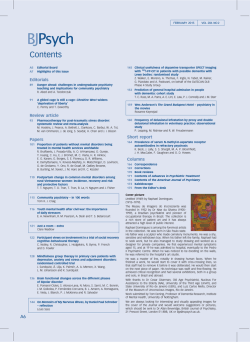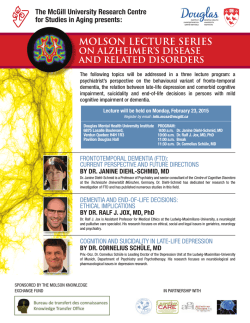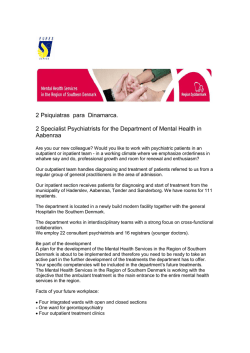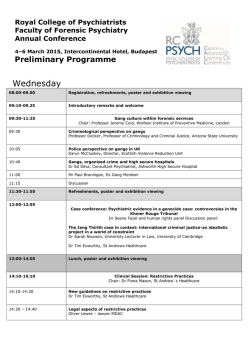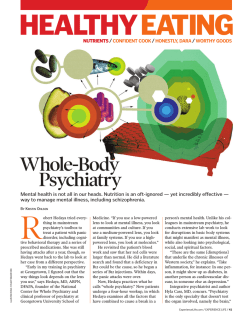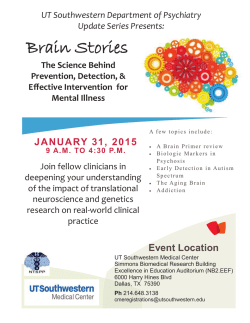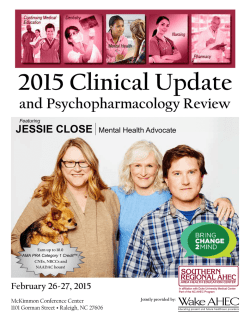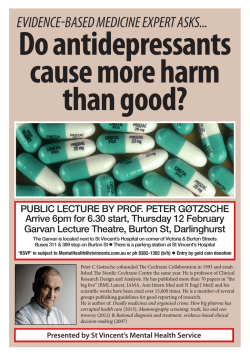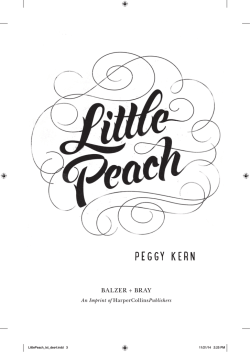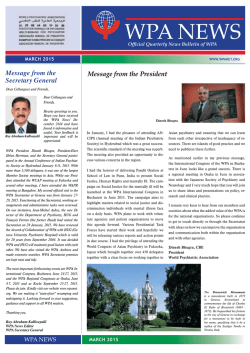
English - Deadly Medicines and Organised Crime
Peter C. Gøtzsche Deadly Psychiatry and Organised Denial Deadly Psychiatry.indd 3 20/07/15 10.29 Deadly Psychiatry © Peter C. Gøtzsche og People’sPress, København 2015 © This edition: People’sPress, 2015 Cover: Stine Trampe Lay out: LYMI ISBN: 978-87-7159-623-6 1. Edition, 1. Print Printed in Denmark 2015 All rights reserved. No part of this publication may be reproduced, transmitted, or stored in a retrieval system, in any form or by any means, electronic, mechanical, photocopying, recording or otherwise, without the prior permission of the publishers. This book is sold subejct to the condition that it shall not, by way of trade or otherwise, be lent, re-sold, hired out or otherwise circulated without the publisher’s prior consent in any form of binding other than that in which it is published and without a similar condition including this condition being imposed on the subsequent purchaser. People’sPress Vester Farimagsgade 41 1606 København V www.artpeople.dk Deadly Psychiatry.indd 4 20/07/15 10.29 Contents Abbreviations . . . . . . . . . . . . . . . . . . . . . . . . . . . . . . . . . . . . 9 Acknowledgements . . . . . . . . . . . . . . . . . . . . . . . . . . . . . . . . 9 About the author . . . . . . . . . . . . . . . . . . . . . . . . . . . . . . . . . . 10 1Introduction . . . . . . . . . . . . . . . . . . . . . . . . . . . . . . . . . . . 12 Silverbacks in the UK exhibit psychiatry’s organised denial . . . . . . . . . . . . . . . . . . . . . . . . . . . . . . 16 2 What does it mean to be mentally ill? . . . . . . . . . . . . . . . 25 On being sane in insane places . . . . . . . . . . . . . . . . . . . . 28 The demons attack you . . . . . . . . . . . . . . . . . . . . . . . . . . 31 Let there be disorder . . . . . . . . . . . . . . . . . . . . . . . . . . . . 32 Psychiatric drugs lead to many wrong diagnoses . . . . . . . 38 The Goodness Industry . . . . . . . . . . . . . . . . . . . . . . . . . . 40 Patients are not consumers . . . . . . . . . . . . . . . . . . . . . . . 41 More funny and fake diagnoses . . . . . . . . . . . . . . . . . . . . 41 3Depression . . . . . . . . . . . . . . . . . . . . . . . . . . . . . . . . . . . . 46 Screening for depression . . . . . . . . . . . . . . . . . . . . . . . . . 46 Antidepressant drugs don’t work for depression . . . . . . . 50 Other important flaws in placebo controlled trials . . . . . 56 Fluoxetine, a terrible drug, and bribery in Sweden . . . . . 58 Harms of antidepressant drugs are denied or downplayed 60 The FDA protects Eli Lilly . . . . . . . . . . . . . . . . . . . . . . . 62 Massive underreporting of suicides in the randomised trials . . . . . . . . . . . . . . . . . . . . . . . . . . . . . . . 66 FDA’s meta-analysis of suicides in trials with 100,000 patients is deeply flawed . . . . . . . . . . . . . . . . 69 Deadly Psychiatry.indd 5 20/07/15 10.29 Another dirty trick: using patient-years instead of patients . . . . . . . . . . . . . . . . . . . . . . . . . . . . 78 Case stories of suicide on SSRIs . . . . . . . . . . . . . . . . . . . 79 Akathisia is the main culprit . . . . . . . . . . . . . . . . . . . . . . 92 Lundbeck: Our drugs protect children against suicide . . 94 Totally misleading observational studies of suicide . . . . . 96 Antidepressant-induced homicides . . . . . . . . . . . . . . . . . 103 The pills that ruin your sex life . . . . . . . . . . . . . . . . . . . . 109 Damage to the foetus . . . . . . . . . . . . . . . . . . . . . . . . . . . . 110 The fraud and lies of GlaxoSmithKline . . . . . . . . . . . . . 113 Trial 329 of paroxetine in children and adolescents . . . . 116 The STAR*D study, a case of consumer fraud? . . . . . . . . 118 4Anxiety . . . . . . . . . . . . . . . . . . . . . . . . . . . . . . . . . . . . . . 132 Sleeping pills . . . . . . . . . . . . . . . . . . . . . . . . . . . . . . . . . . 135 5ADHD . . . . . . . . . . . . . . . . . . . . . . . . . . . . . . . . . . . . . . . 137 Childhood ADHD . . . . . . . . . . . . . . . . . . . . . . . . . . . . . . 137 Adult ADHD . . . . . . . . . . . . . . . . . . . . . . . . . . . . . . . . . . 142 ADHD drugs . . . . . . . . . . . . . . . . . . . . . . . . . . . . . . . . . . 145 ADHD drugs for children . . . . . . . . . . . . . . . . . . . . . . . . 145 ADHD drugs for adults . . . . . . . . . . . . . . . . . . . . . . . . . . 150 Harms from ADHD drugs . . . . . . . . . . . . . . . . . . . . . . . . 151 6Schizophrenia . . . . . . . . . . . . . . . . . . . . . . . . . . . . . . . . . 156 Human guinea pigs in America . . . . . . . . . . . . . . . . . . . . 160 The chemical lobotomy . . . . . . . . . . . . . . . . . . . . . . . . . . 161 Drug trials in schizophrenia . . . . . . . . . . . . . . . . . . . . . . . 165 Antipsychotics kill many people . . . . . . . . . . . . . . . . . . . 172 A patient history . . . . . . . . . . . . . . . . . . . . . . . . . . . . . . . 175 Pushing antipsychotic drugs . . . . . . . . . . . . . . . . . . . . . . 177 Eli Lilly’s crimes related to olanzapine . . . . . . . . . . . . . . 180 Stigmatisation . . . . . . . . . . . . . . . . . . . . . . . . . . . . . . . . . 183 Hearing voices . . . . . . . . . . . . . . . . . . . . . . . . . . . . . . . . . 184 7 Bipolar disorder . . . . . . . . . . . . . . . . . . . . . . . . . . . . . . . . 189 “Mood stabilisers” . . . . . . . . . . . . . . . . . . . . . . . . . . . . . . 192 A young man’s experience . . . . . . . . . . . . . . . . . . . . . . . . 194 Deadly Psychiatry.indd 6 20/07/15 10.29 8Dementia . . . . . . . . . . . . . . . . . . . . . . . . . . . . . . . . . . . . . 197 We make people demented with psychotropic drugs . . . 204 9Electroshock . . . . . . . . . . . . . . . . . . . . . . . . . . . . . . . . . . 207 10 Psychotherapy and exercise . . . . . . . . . . . . . . . . . . . . . . . 212 Psychotherapy for anxiety and depression . . . . . . . . . . . 214 Psychotherapy for obsessive compulsive disorder . . . . . . 217 Psychotherapy for schizophrenia . . . . . . . . . . . . . . . . . . . 218 Exercise . . . . . . . . . . . . . . . . . . . . . . . . . . . . . . . . . . . . . . 223 1 1 What happens in the brain? . . . . . . . . . . . . . . . . . . . . . . 227 Calling psychiatric drugs “anti”-something is a misnomer . . . . . . . . . . . . . . . . . . . . . . . . . . . . . . . . . 227 Genetic studies and transmitter research . . . . . . . . . . . . 231 Chronic brain damage . . . . . . . . . . . . . . . . . . . . . . . . . . . 233 Addiction to psychiatric drugs . . . . . . . . . . . . . . . . . . . . 237 Drug regulators, the extended arm of industry . . . . . . . . 240 Drug dependence is often misinterpreted as relapse of the disease . . . . . . . . . . . . . . . . . . . . . . . . . . . . . . . . 242 The chemical imbalance nonsense . . . . . . . . . . . . . . . . . 247 1 2 Withdrawing psychiatric drugs . . . . . . . . . . . . . . . . . . . . 255 The worst drug epidemic ever . . . . . . . . . . . . . . . . . . . . . 255 How can it be done? . . . . . . . . . . . . . . . . . . . . . . . . . . . . 259 1 3 Organised crime, corruption of people and science, and other evils . . . . . . . . . . . . . . . . . . . . . . . . . . . . . . . 267 Lundbeck’s evergreening of citalopram . . . . . . . . . . . . . . 273 Psychiatry’s fantasy world . . . . . . . . . . . . . . . . . . . . . . . . 275 A Danish witch hunt . . . . . . . . . . . . . . . . . . . . . . . . . . . . 278 Lecture tour in Australia . . . . . . . . . . . . . . . . . . . . . . . . . 284 Psychiatry is not evidence-based medicine . . . . . . . . . . . 287 Can we reform psychiatry or is a revolution needed? . . . 290 14 Deadly psychiatry and dead ends . . . . . . . . . . . . . . . . . . . 297 The connection between psychotropic drugs and homicide . . . . . . . . . . . . . . . . . . . . . . . . . . . . . . . . 300 How few drugs do we need? . . . . . . . . . . . . . . . . . . . . . . . 303 Deadly Psychiatry.indd 7 20/07/15 10.29 How many people are killed by psychotropic drugs? . . . . 307 15 Forced treatment and involuntary detention should be banned . . . . . . . . . . . . . . . . . . . . . . . . . . . . . 314 Human rights in Europe . . . . . . . . . . . . . . . . . . . . . . . . . 315 Forced treatment . . . . . . . . . . . . . . . . . . . . . . . . . . . . . . . 316 Patients’ rights . . . . . . . . . . . . . . . . . . . . . . . . . . . . . . . . . 317 My comments . . . . . . . . . . . . . . . . . . . . . . . . . . . . . . . . . 319 Forced treatment must be banned . . . . . . . . . . . . . . . . . . 324 United Nations forbids forced treatment and involuntary detention . . . . . . . . . . . . . . . . . . . . . . . . . 333 Dear Luise . . . . . . . . . . . . . . . . . . . . . . . . . . . . . . . . . . . . 337 16 What can patients do? . . . . . . . . . . . . . . . . . . . . . . . . . . . 354 17 What can doctors do? . . . . . . . . . . . . . . . . . . . . . . . . . . . 359 18 Helpful websites . . . . . . . . . . . . . . . . . . . . . . . . . . . . . . . . 365 Index . . . . . . . . . . . . . . . . . . . . . . . . . . . . . . . . . . . . . . . . . . . 367 Deadly Psychiatry.indd 8 20/07/15 10.29 Abbreviations ADHD: Attention Deficit Hyperactivity Disorder APA: American Psychiatric Association CI: Confidence Interval DSM: Diagnostic and Statistical Manual of Mental Disorders EMA: European Medicines Agency FDA: Food and Drug Agency (USA) ICD: International Classification of Diseases GP: General Practitioner NICE: National Institute for Health and Care Excellence (UK) NIMH: National Institute of Mental Health (USA) OCD: Obsessive Compulsive Disorder SSRI: selective serotonin reuptake inhibitor, an antidepressant UN: United Nations Acknowledgements I am very grateful for the inspiration and advice I have received from numerous patients and their relatives, colleagues, friends, lawyers and others, which have improved substantially on what I would have been able to write on my own. I mention here a few people who have been particularly inspiring through their books or in other ways, or who have commented on sections in my book: Peter Breggin, Paula Caplan, Dorrit Cato Christensen, Jens Frydenlund, Linda Furlini, Jim Gottstein, David Healy, Allan Holmgren, Lisbeth Kortegaard, Joanna Moncrieff, Luke Montagu, Peer Nielsen, Peter Parry, Melissa Raven, John Read, Bertel Rüdinger, Olga Runciman, and Robert Whitaker. At least four of these people have personal experiences from being a psychiatric patient. Deadly Psychiatry.indd 9 Abbreviations9 20/07/15 10.29 About the author Professor Peter C. Gøtzsche graduated as a Master of Science in biology and chemistry in 1974 and as a physician in 1984. He is a specialist in internal medicine; worked in the drug industry 1975–83, and at hospitals in Copenhagen 1984–95. With about 80 others, he helped start The Cochrane Collaboration in 1993 with the founder, Sir Iain Chalmers, and established The Nordic Cochrane Centre the same year. He became professor of Clinical Research Design and Analysis in 2010 at the University of Copenhagen. Gøtzsche has published more than 70 papers in “the big five” (BMJ, Lancet, JAMA, Annals of Internal Medicine and New England Journal of Medicine) and his scientific works have been cited over 15,000 times. Gøtzsche has an interest in statistics and research methodology. He is a member of several groups publishing guidelines for good reporting of research and has co-authored CONSORT for random ised trials (www.consort-statement.org) STROBE for observational studies (www.strobe-statement.org), PRISMA for systematic re views and meta-analyses (www.prisma-statement.org), and SPIRIT for trial protocols (www.spirit-statement.org). He was an editor in the Cochrane Methodology Review Group 1997-2014. Books by Peter C Gøtzsche Gøtzsche PC. Deadly medicines and organised crime: How big pharma has corrupted healthcare. London: Radcliffe Publishing; 2013. Translated into several languages, see www.deadlymedicines.dk. 10 Deadly Psychiatry.indd 10 Deadly Psychiatry 20/07/15 10.29 Gøtzsche PC. Dødelig medicin og organiseret kriminalitet: Hvordan medicinalindustrien har korrumperet sundhedsvæsenet. København: People’s Press; 2013. Gøtzsche PC. Mammography screening: truth, lies and controversy. London: Radcliffe Publishing; 2012. Gøtzsche PC. Rational diagnosis and treatment: evidence-based clinical decision-making. 4th ed. Chichester: Wiley; 2007. Wulff HR, Gøtzsche PC. Rationel klinik. Evidensbaserede diagnostiske og terapeutiske beslutninger. 5. udgave. København: Munks gaard Danmark; 2006. Gøtzsche PC. På safari i Kenya. København: Samlerens Forlag; 1985. Deadly Psychiatry.indd 11 About the author11 20/07/15 10.29 1 Introduction Psychiatry is not an easy specialty. It requires a lot of patience and understanding, and there are many frustrations. I am sure psychiatrists sometimes get frustrated at patients who continue to destroy their lives, refusing to take on board the good advice they have been offered about how they could improve on their attitude to life’s many troubles. This book is not about the psychiatrists’ problems, however. It is about why psychiatry has failed to deliver what patients want, and what the consequences are of focusing on using harmful drugs of questionable benefit. Most patients don’t respond to the drugs they receive and, unfortunately, the psychiatrists’ frustrations at the lack of progress often lead to the prescribing of more drugs or higher doses, further harming the patients. Psychiatric drugs are so harmful that they kill more than half a million people every year among those aged 65 and over in the United States and Europe (see Chapter 14). This makes psychiatric drugs the third leading cause of death, after heart disease and cancer. I don’t think there is anything psychiatric patients fear more than forced treatment, and this is an important reason why having close contact with the psychiatric treatment system markedly increases suicides (see Chapter 15). I shall explain why forced treatment is unethical and should be banned and also demonstrate that psy chiatry is possible without it. Many psychiatric drugs not only increase total mortality but also increase the risk of suicide and homicide, while no drug agency anywhere has approved any drug as being effective in preventing suicides. Lithium is an exception, as it might possibly reduce suicides (see Chapter 7). 12 Deadly Psychiatry.indd 12 Deadly Psychiatry 20/07/15 10.29 Widespread overdiagnosis and overtreatment is another issue I take up. There is huge overdiagnosis of mental disorders, and once you receive a psychiatric diagnosis everything you do or say becomes suspect, as you are now under observation, which means that the initial, perhaps tentative diagnosis, all too easily becomes a self-fulfilling prophecy (see Chapter 2). I believe we could reduce our current usage of psychotropic drugs by 98% and at the same time improve people’s mental health and survival (see Chapter 14). The most important reason for the current drug disaster it is that leading psychiatrists have allowed the drug industry to corrupt their academic discipline and themselves. I have written this book primarily for the patients, particularly those who have desperately wanted to come off their drugs but were met with hostile and arrogant reactions from their doctors, and I shall explain how it is possible to safely taper drugs (Chapter 12). I have also written the book for young psychiatrists in training in the hope that it could inspire them to revolutionise their specialty, which is badly needed. One sign that psychiatry is in deep crisis is that more than half the patients believe their mental dis order is caused by a chemical imbalance in the brain. They have this misperception from their doctors, which means that more than half the psychiatrists lie to their patients. I know of no other specialty whose practitioners lie to their patients. Psychiatrists also lie to themselves and to the public, and I shall give many examples of official statements that exaggerate the benefits of psychiatric interventions by five to ten times and underestimate the harmful effects by a similar factor. Those at the top of the hierarchy I call “silverbacks,” since they are almost always males and behave like primate silverbacks in the jungle, keeping others away from absolute power, which in nature carries rewards such as easy access to females – in psychiatry this translates into money and fame. These silverbacks suffer from collective, organised denial. They refuse to see the damage they cause even when the evidence is overwhelming. Further, they have unit ed around a number of myths and misconceptions, which they defend stubbornly but which are very harmful for patients. Some of the worst, which I shall debunk in this book, are: Deadly Psychiatry.indd 13 Introduction13 20/07/15 10.29 • psychiatric diagnoses are reliable; • it reduces stigmatisation to give people a biological or a genetic explanation for their mental disorder; • the usage of psychiatric drugs reflects the number of people with mental disorders; • people with mental disorders have a chemical imbalance in their brain and psychiatrists can fix this imbalance with drugs, just like endocrinologists use insulin for diabetes; • long-term treatment with psychiatric drugs is good, as it prevents recurrence of the disease; • treatment with antidepressants does not lead to dependence; • treatment of children and adolescents with antidepressants protects against suicide; • depression, ADHD and schizophrenia lead to brain damage; and • drugs can prevent brain damage. I shall also explain how I have come to the conclusion that psychiatric research is predominantly pseudoscience, and why reliable research constantly tells us a very different story to the fairy tale that leading psychiatrists want us to believe in. I am a specialist in internal medicine and took an interest in psychiatry in 2007 when Margrethe Nielsen from the Danish Consumer Council approached me with an idea for her PhD thesis: “Why is history repeating itself? A study on benzodiazepines and antidepressants (SSRIs).” Her studies showed that, indeed, history has repeated itself. We have repeated the same mistakes with the SSRIs that we made with benzodiazepines, and before them with barbiturates. We have creat ed a huge epidemic of drug overuse with just as many drug addicts on SSRIs as on benzodiazepines (see Chapter 12). Margrethe’s findings were not welcomed by two of her examiners, who had turfs to defend. One, Steffen Thirstrup, worked for the Danish drug agency, the other, John Sahl Andersen, was a general practitioner. Our drug agencies have contributed substantially to the current misery, and most of the drug harms are caused by general practitioners, who prescribe about 90% of the psychiatric drugs. They rejected her thesis for no good reason, but having appeal ed to the University, she defended it successfully.1 If psychiatrist 14 Deadly Psychiatry.indd 14 Deadly Psychiatry 20/07/15 10.29 David Healy had not been the third examiner, she might not have obtained her PhD, which would have been a gross injustice, as her research is sound and her PhD thesis is considerably better than many I have seen. Unwelcome facts are being suppressed all the time, and I shall give numerous examples of the works of the “doubt industry” where people incessantly publish seriously flawed research to provide support for their unsustainable ideas. After having studied the science carefully, I note that some peo ple I have met and several organisations have come to the conclu sion that the way we currently use psychiatric drugs and the way we practice psychiatry cause more harm than good. The general public agrees and feels that antidepressants, antipsychotics, electroshock and admission to a psychiatric ward are more often harmful than beneficial (see Chapter 13). I have no doubt they are right, and the double-blind placebo controlled randomised trials – which are not so blind as intended – have rather consistently shown that it is the psychiatrists that think their drugs are effective, not the patients (see Chapter 3). Investigators who have not been blinded effectively can see the exact opposite of what is actually true when they medicate patients. They see what they want to see, which is what is convenient for them and for their specialty, not what really happens (see Chapters 3 and 6). Cochrane reviews have shown that it is doubtful whether antidepressants are effective for depression (see Chapter 3) and whether antipsychotics are effective for schizophrenia (see Chapter 6). Some drugs can be helpful sometimes for some patients, particularly in the acute phase where a patient can be so tormented by panic or delusions that it can be helpful to dampen the emotions with a tranquilliser. However, unless doctors become much more expert in the way they use psychiatric drugs which would mean using them very little, in low doses, and always with a plan for tapering them off, our citizens would be far better off if we removed all psycho tropic drugs from the market. Some people will see this as a provocative statement, but it isn’t. It is based on solid science, which I shall document. I am used to being called provocative or controversial, which I take to mean that Deadly Psychiatry.indd 15 Introduction15 20/07/15 10.29 I am telling the truth. In healthcare, the truth is rarely welcomed, as so many people have so many wrong ideas to defend. The silverbacks of psychiatry have created a fantasy world of their own, which is not evidence-based medicine and which is riddled by harmful polypharmacy (see Chapter 13). Silverbacks in the UK exhibit psychiatry’s organised denial People critical of psychiatry are often met with ad hominem attacks from the psychiatric establishment or with scientific arguments of little merit. This happened to me after I gave a keynote lecture in 2014 at the opening meeting of the Council for Evidence-based Psychiatry in the House of Lords, chaired by the Earl of Sandwich, called “Why the use of psychiatric drugs may be doing more harm than good.” The other speakers, psychiatrist Joanna Moncrieff and anthropologist James Davies, gave similar talks and have written critical books of mainstream psychiatry.2-5 Three months later, psychiatrist David Nutt and four male colleagues (I shall refer to them by a collective “DN”) attacked me in the first issue of a new journal, Lancet Psychiatry.6 Their paper is only two pages long, but it is so typical of the silverbacks’ knee-jerk reactions when criticised that I shall describe it in some detail. Anti-everything DN started out by saying that, “Psychiatry is used to being attacked by external parties with antidiagnosis and antitreatment agendas.” Silverbacks often say that those coming from another tribe (“external parties”) are not allowed to criticise them. This arrogant attitude has unfortunate consequences because many psychiatrists adopt the same position towards their patients, thinking they need not listen to them or take seriously their criticism of the drugs they ingest. It is also common for silverbacks to stigmatise those who dare criticise psychiatry as being anti-something, and DN use the terms “anti-psychiatry” and “anti-capitalist” associated with “ex treme or alternative political views.” “New nadir in irrational polemic” DN were unhappy with newspaper headlines such as “Antidepressants do more harm than good, research says,” which appeared in 16 Deadly Psychiatry.indd 16 Deadly Psychiatry 20/07/15 10.29 The Times and The Guardian after our council meeting, and they called this a “new nadir in irrational polemic.” They found it especially worrying that I being a co-founder of the Cochrane Collaboration, an initiative set up to provide the best evidence for clinical practitioners, had apparently suspended my “training in evidence analysis for popular polemic.” Silverbacks usually speak with the same voice as the drug industry because it so generously supports them financially (see Chapter 13), and DN are not an exception. We are told: “Depression is a serious and recurrent disorder that is currently the largest cause of disability in Europe and is projected to be the leading cause of morbidity in high-income countries by 2030.” No British understatement here, though there is no way we can reliably count the number of people with depression. The criteria for the diagnosis are arbitrary and consensus-based, and they are now so broad that a large part of the healthy population can get the diagnosis (see Chapter 3). It is therefore misleading to say that depression is a serious disorder. Most people have mild symptoms of everyday distress that hit most of us from time to time; very few are seriously depressed. Worse still, the dramatic increase in depres sion-related morbidity that DN speak about has been caused by the psychiatrists themselves. The drugs they use do not cure depression but turn many self-limiting episodes into chronic ones (see Chapter 12). This is not helping patients; it is serving the interests of psy chiatry and the pharmaceutical industry. “Impressive ability to prevent recurrence of depression” The DN group argues that antidepressants are among the most effective drugs we have in the whole of medicine and mentions their “impressive ability to prevent recurrence of depression, with a number needed to treat of around three [to prevent one recurrence].” It certainly looks impressive but it isn’t true. The trials that have shown these effects, where half of the patients continue with their antidepressant drug after they have recovered while the other half is switched to placebo, are totally unreliable (see Chapter 11). This is because those switched to placebo have to go cold turkey, i.e. abstinence symptoms occur because their brain has adapted to the antidepressant, just like alcoholics get into trouble if they suddenly stop drinking, and these symptoms can mimic depression. In their praise of antidepressants, DN also say they have an Deadly Psychiatry.indd 17 Introduction17 20/07/15 10.29 impressive effect on acute depression. They haven’t. It is likely that they have no effect at all (see Chapter 3). DN note that fewer participants on an antidepressant than on placebo withdrew from the trials because of treatment inefficacy, which they interpret as evidence that antidepressants are effective. This interpretation is not appropriate. It is often the combination of the perceived benefits and harms that determines whether a patient stays in a trial. A patient who is on an active drug has often guessed this, because of the drug’s side effects, and might therefore be more inclined to continue in the trial even if the drug has no effect, particularly since psychiatrists often tell their patients that it may take a while before the effect appears. Conversely, patients on placebo have no incentive to carry on and therefore, more than in the drug group, drop out due to lack of effect. It is therefore advised in textbooks on research methods not to focus on the number of patients who drop out because of lack of effect. It only makes sense to look at the total number of drop-outs, which is also the most relevant outcome for treatments that are not curative but only have an effect on the patients’ symptoms. Patients are the best judges for deciding whether a perceived benefit of taking a drug outweighs its side effects, and they find the drugs pretty useless, as just as many patients stop treatment on antidepressants as on placebo in the trials for any reason.7 Does academic debate increase suicides? The DN group mentions that many people who are not taking antidepressants commit suicide, claiming that a “blanket condemnation of antidepressants by lobby groups and colleagues risks increasing that proportion.” In my book about mammography screening,8 I called this the you are killing my patients argument. Those who raise uncomfortable questions about popular interventions are accused of being responsible for the death of many people. But let’s think. If we generalised this argument to become a common ethical standard, researchers could never question any intervention if it was believed to save lives. Thus, we would probably still be performing bloodletting in our hospitals for all kinds of diseases, even for cholera, where such treatment is deadly. More importantly, the crux of the argument is wrong. Antidepressants don’t protect people against suicide (see Chapter 3). 18 Deadly Psychiatry.indd 18 Deadly Psychiatry 20/07/15 10.29 DN claim that most of those who commit suicide are depressed, but the underlying data do not allow such a conclusion.9 A widely cited study found that most suicides were related to a diagnosis of depression, but only 26% of the people were known to have been diagnosed with depression before they killed themselves. All the others got a post-mortem diagnosis based on a so-called psycho logical autopsy, and it is self-evident that establishing a diagnosis of a psychiatric disorder in a dead person is a highly bias-prone process. Social acceptability bias threatens the validity of such retrospective diagnosis-making. Relatives often seek socially acceptable explanations and may be unaware of or unwilling to disclose certain problems, particularly those that generate shame or put some of the blame on themselves. It is therefore tempting to put the blame on an impersonal thing like a disease, which cannot protest although it might never have existed. It is a very popular belief among psychiatrists that most of those who commit suicide suffer from depression but it is doubtful whether this is correct – people kill themselves for many reasons other than depression. The next argument that the DN people put forward to prove their case that antidepressants protect against suicide isn’t any better. They claim that more than 70% are not taking an antidepressant at the time of death. Obviously, when people who are not depressed kill themselves, there is no case for taking an antidepressant before they die. Furthermore, antidepressants can cause an extreme form of restlessness called akathisia, which predisposes to suicide10, 11 and which can make the patient stop taking the drug before the suicide. Stopping an antidepressant abruptly, e.g. because the patient ran out of pills, can also cause akathisia and suicide. Thus, there are at least three good reasons why people who kill themselves might not have taken antidepressants at the time of death. DN’s next argument is also unconvincing. They say that in countries where antidepressants are used properly, suicide rates have fallen substantially. Well, in countries where cars are used properly (causing few traffic accidents), birth rates have fallen substantially, but that doesn’t prove anything. Scientifically sound studies have never been able to find a relationship between increased use of anti depressants and falling suicide rates, or vice versa (see Chapter 3). Deadly Psychiatry.indd 19 Introduction19 20/07/15 10.29 “Some of the safest drugs ever made” The hyperbole escalates towards the end of DN’s article. We are told that the SSRIs are some of the safest drugs ever made and that their adverse effects are rarely severe or life threatening. The facts are that SSRIs kill one of 28 people above 65 years of age treated for one year; that half of the patients get sexual side effects; and that half of the patients have difficulty stopping antidepressants because they become dependent on them (see Chapter 3). When silverback psychiatrists call SSRIs some of the safest drugs ever made, I believe it is fair to say that it is unsafe for people who suffer from something that could be treated with an SSRI to consult a psychiatrist. Critics “prefer anecdote to evidence” It is surreal to me when DN say that, “Many of the extreme examples of adverse effects given by the opponents of antidepressants are both rare and sometimes sufficiently bizarre as to warrant the description of an unexplained medical symptom,” and that, “To attribute extremely unusual or severe experiences to drugs that appear largely innocuous in double-blind clinical trials is to prefer anecdote to evidence.” DN do not appreciate that the main reason that SSRIs appear innocuous in clinical trials is that the companies have manipulated the data to an extraordinary degree (see Chapter 3).11-13 Furthermore, DN fail to listen to patients. That an adverse effect is “bizarre” doesn’t disqualify it. Many patients have experienced the same highly bizarre adverse effects, which have returned when the patients were exposed to the same drug again. This is an accepted method for establishing cause-effect relationships in clinical pharmacology, which is called challenge, dechallenge and rechallenge. In 2010, on one of the occasions where I lectured to Danish psychiatrists, I got nowhere with this argument in a discussion with a US psychiatrist. He argued that the randomised trials had not shown an increased risk of suicide, but he didn’t understand that it is not a requirement for establishment of harms that they have been confirmed in randomised trials. He might have listened too much to the industry, which downplays the harmful effects of their drugs by pointing out that they weren’t statistically significant, often after they have manipulated the data to ensure that no significant differ ences would see the light of day. 20 Deadly Psychiatry.indd 20 Deadly Psychiatry 20/07/15 10.29 DN suggest that we should ignore “severe experiences to drugs,” which they dismiss as anecdotes and claim might be distorted by the “incentive of litigation”. This is the height of professional denial and arrogance. It is deeply insulting to those parents who have lost a healthy child and those spouses who have lost a partner whom an SSRI drove to suicide or homicide. Furthermore, members of the Council for Evidence-based Psychiatry explained in Lancet Psy chiatry that British withdrawal-support charities report alarming numbers of people suffering disabling symptoms for multiple years following withdrawal from antidepressants.14 “Insulting to the discipline of psychiatry” In their finishing remarks, DN say that my “extreme assertions ... are insulting to the discipline of psychiatry ... and at some level express and reinforce stigma against mental illnesses and the people who have them.” I shall explain in Chapter 6 that it is the psychiatrists that stigmatise the patients, not those who criticise psychiatry. DN also say that, “The anti-psychiatry movement has revived itself with the recent conspiracy theory that the pharmaceutical industry, in league with psychiatrists, actively plots to create diseases and manufacture drugs no better than placebo. The anti-capitalist flavour of this belief resonates with anti-psychiatry’s strong association with extreme or alternative political views.” In my reply, I noted that, “This is the language of people who are short of arguments.”15 It was pretty ironic that – of all their expos tulations – DN lamented that critics of psychiatry believe that the pharmaceutical industry and the psychiatrists create diseases and use drugs no better than a placebo, as if this was a self-evidently absurd proposition. As I shall explain later, this is pretty much true. Whereas it is not true when DN say that those who criticise the overuse of psychiatric drugs are “extreme” or “alternative.” When I wrote to the editor of Lancet Psychiatry and requested an opportunity to defend my academic reputation, the editor told me that the Nutt and colleagues’ paper was given an independent peer review, as well as being subjected to legal review. This is difficult to understand, given its many errors, the pronounced ad hominem attacks, and the tough UK libel law. I addressed the worst of DN’s misconceptions in my reply.15 I also noted that Nutt and two of his co-authors, Guy M Goodwin and Deadly Psychiatry.indd 21 Introduction21 20/07/15 10.29 Stephen Lawrie, had between them declared 22 conflicts of interest in relation to drug companies, and I wondered whether this explained their dismissal of psychotherapy, although it is effective and recommended by the UK’s National Institute for Health and Care Excellence (NICE). After having read this, you might think that – in their own words about their critics – these psychiatrists are “extreme,” as they cherish so many unsustainable opinions about their own field of work. But unfortunately they are not. Professor David Nutt is a mainstream psychiatrist and an influential one. He was previously the United Kingdom’s drug czar (the main adviser to the government) until he was sacked for claiming that ecstasy is no more dangerous than riding a horse, which he called “equasy,” short for “Equine Addiction Syndrome.”16 Nutt won the 2013 John Maddox Prize for Standing Up for Science. The judges awarded him the prize in recognition of the impact his think ing and actions have had in influencing evidence-based classifica tion of drugs, and his continued courage and commitment to ration al debate, despite opposition and public criticism. Words fail me. Professor Guy M Goodwin is head of Oxford University’s Department of Psychiatry and was President of the British Association for Psychopharmacology in 2002-2004. Professor Dinesh Bhugra, at the Institute of Psychiatry at King’s College in London, was previously President of the UK’s Royal College of Psychiatry and is currently president-elect of the World Psychiatric Association. Professor Seena Fazel is a Forensic Psychiatrist at Oxford University’s Department of Psychiatry; he has an interest in violent crime and suicide. Professor Stephen Lawrie is Head of the Division of Psychiatry at the University of Edinburgh and is on the editorial board of Lancet Psychiatry. These psychiatrists are at the top of their profession and yet they hold views which are in direct contrast to the science in their field. This illustrates that psychiatry is in deep crisis and that its leaders suffer from organised denial. My preference is to mention names because people should be held responsible for their actions and arguments. If they do something 22 Deadly Psychiatry.indd 22 Deadly Psychiatry 20/07/15 10.29 laudable, they would be disappointed if they were anonymous, but it must work both ways. If I concealed the names when people did something reproachable, or sustained an erroneous belief, I would be inconsistent, and my readers would try to guess anyway who they were. Science is not about guesswork, which is another reason why I prefer to mention names. However, it is fair to point out that when I name a person for something he or she should not be proud of, there are thousands of others that have done the same or share the same beliefs. References 1 Nielsen M. Selective Serotonin Reuptake Inhibitors (SSRI) – sales, withdrawal reactions and how drug regulators reacted to this with benzodiazepines as comparator (PhD thesis). University of Copenhagen; 2013. 2 Moncrieff J. The bitterest pills. Basingstoke: Palgrave Macmillan; 2013. 3 Moncrieff J. The myth of the chemical cure: a critique of psychiatric drug treatment. Basingstoke: Palgrave Macmillan; 2007. 4 Moncrieff J. A straight talking introduction to psychiatric drugs. Ross-on-Wye: PCCS Books; 2009. 5Davies J. Cracked: Why psychiatry is doing more harm than good. London: Icon Books; 2013. 6Nutt DJ, Goodwin GM, Bhugra D, et al. Attacks on antidepressants: signs of deep-seated stigma? Lancet Psychiatry 2014;1:103–4. 7Barbui C, Furukawa TA, Cipriani A. Effectiveness of paroxetine in the treatment of acute major depression in adults: a systematic reexamination of publish ed and unpublished data from randomized trials. CMAJ 2008;178:296–305. 8Gøtzsche PC. Mammography screening: truth, lies and controversy. London: Radcliffe Publishing; 2012. 9Raven M. Depression and antidepressants in Australia and beyond: a critical public health analysis (PhD thesis). University of Wollongong, Australia; 2012. http://ro.uow.edu.au/theses/3686/. 10Bass A. Side effects – a prosecutor, a whistleblower, and a bestselling antidepressant on trial. Chapel Hill: Algonquin Books; 2008. 11Healy D. Let them eat Prozac. New York: New York University Press; 2004. 12Gøtzsche PC. Deadly medicines and organised crime: How big pharma has corrupted health care. London: Radcliffe Publishing; 2013. 13Virapen J. Side effects: death. College Station: Virtualbookworm.com Publishing; 2010. 14Timimi S, Thomas P, Davies J, et al. Antipsychiatry and the antidepressants debate. Lancet Psychiatry 2014;1:174. Deadly Psychiatry.indd 23 Introduction23 20/07/15 10.29 15Gøtzsche PC. Why I think antidepressants cause more harm than good. Lancet Psychiatry 2014;1:104-6 (available at www.deadlymedicines.dk). 16Hope C. Ecstasy ‘no more dangerous than horse riding.’ The Telegraph 2009 Feb 7. 24 Deadly Psychiatry.indd 24 Deadly Psychiatry 20/07/15 10.29
© Copyright 2026
